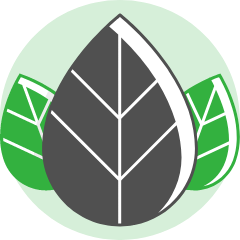7Taking care of the environment
In shaping its environmental policy, VKG places great value on social responsibility and understands that environmental impact management is a prerequisite to sustainable development. We have created an integral and systemic approach to environmental issues, which is in accordance with European Union and Estonian legal acts as well as the environmental requirements arising from the Best Available Technology (BAT) framework documents.

All VKG’s production units are in conformity with environmental requirements, but we are still constantly looking for ways to optimise processes and reduce the production footprint. Our aim is to make full use of the potential of oil shale in accordance with the principles of a circular economy with the smallest possible footprint.
In 2022, VKG participated in legislative drafting processes related to its existing and planned production activities. We provided an input into Estonia’s positions on Fit for 55 and into the development of the report on the study of shale oil production BATs and the Forestry Development Plan until 2030, as well as into the amendment of the Industrial Emissions Directive, the regulation concerning the European Pollutant Release and Transfer Register, the Public Water Supply and Sewerage Act and the Earth’s Crust Act.
Environmental areas of activity in 2022

Reduction of air emissions
As the largest Estonian producer of shale oil products, our activities have an effect on the surrounding environment and the local community through emissions from our production processes. In 2022, we performed an extensive reconstruction of the Petroter I shale oil plant, which also included the installation of a new flue gas utilisation boiler and an electrical filter which help to significantly reduce the impact of VKG’s production activities on the quality of ambient air in the city of Kohtla-Järve and the surrounding area.

Integrated oil industry permits
The integrated environmental permit of the Petroter installation of VKG Oil was amended in 2022, in order to bring into conformity with the monitoring and other requirements changed by a regulation of the Minister of the Environment. At the end of the year, the Environmental Board also issued an amended draft integrated permit of the Kiviter installation, the main amendments to which included the removal of liquidated and sealed emission sources from the permit, and updates arising from the regulations of the Minister of the Environment.

Reduction of odoriferous disturbances
A thorough renewal and implementation of METEO procedures significantly reduced the intensity and duration of odoriferous disturbances related to VKG’s production processes.

Greenhouse gases
In 2022, the installations of VKG Group were issued free of charge quota units in an amount about 35,000 tonnes smaller than in the previous year. The reason for this was a decrease in the 2020–2021 production levels compared to the previous two-year reference period.

Oil shale industry waste landfill
Tests of planting greenery on slopes with waste water sediment compost were completed at VKG’s shale oil industry waste landfill. The results of the tests were more successful than hydro-seeding the landfill slopes and we plan to expand the compost-based greenery area on the landfill slopes in the coming years. In addition, the report of the 1st stage of the strategic assessment of the environmental impact of the local government’s designated spatial plan for VKG’s new industrial waste landfill was prepared in 2022 for public display and discussions.

Bioproducts production complex
As at the end of the year, the preparation of the draft decision on the pre-selection of the location of VKG’s bioproducts production complex and the report on the 1st stage of the strategic assessment of environmental impact was nearly completed. The public display of and public discussions over these take place in 2023.

Mineral resource extraction permits
At the request of VKG Kaevandused OÜ, the Environmental Board changed the maximum annual rate of oil shale extraction under the issued environmental permit of the Uus-Kiviõli II oil shale mine from the former 2 million tonnes to 5 million tonnes. The said change will apply until Enefit Power AS has not started to extract oil shale at their Uus-Kiviõli mining claim. In order to permanently apply the maximum annual rate of 5 million tonnes, VKG Kaevandused OÜ and Enefit Power AS will jointly conduct an environmental impact assessment (EIA) within the framework of which the EIA programme was prepared and approved by the Environmental Board and activities related to preparing the EIA report started in 2022.
In addition, the Environmental Board also approved VKG Kaevandused OÜ’s EIA programme for the extension of the mining claim of the Ojamaa oil shale mine in 2022 and by the end of the year the company submitted the EIA report to the Environmental Board for asking the positions of relevant authorities.

Important activities in 2023 include:
- Adding special parts concerning air and water to the environmental permit of the Uus-Kiviõli II Mine and continuing with the current EIA;
- Amending the environmental permit for expanding the Ojamaa Mine;
- Amending the waste permit of the Ojamaa Mine;
- Participating in the work group for the shale oil production BAT study and the preparation of conclusions;
- Providing an input into the updating of the Industrial Emissions Directive.
Priorities also include conducting the strategic assessments of the environmental impact of the designated spatial plans for the oil shale industrial waste landfill and the bioproducts production complex as well as the preliminary EIA for the plastic plant.
In the coming years, VKG’s development and environmental activities will continually focus on energy efficiency, the reuse of waste, the reduction of air emission, and projects related to the climate neutrality policy.
